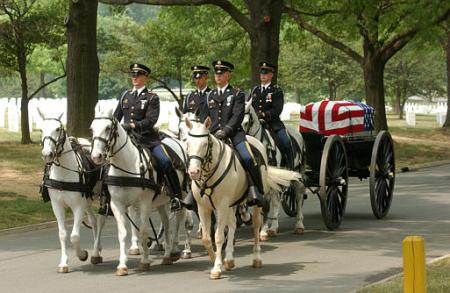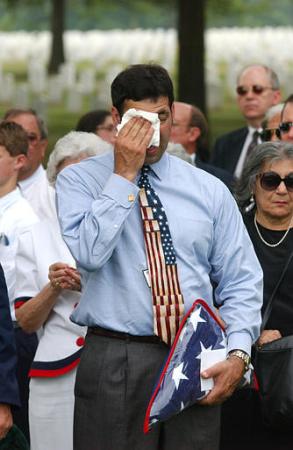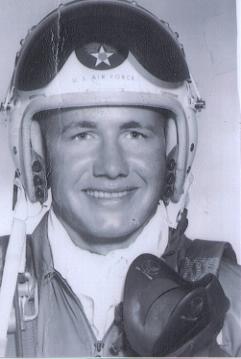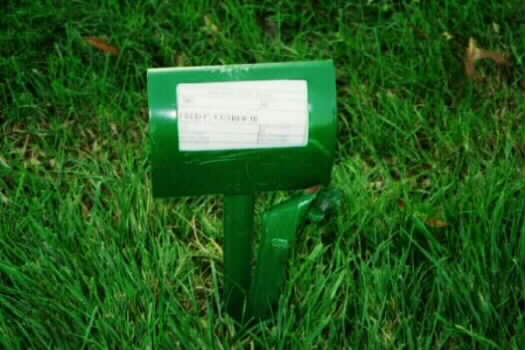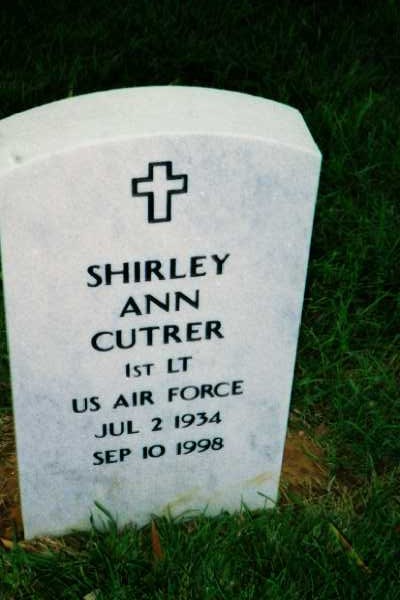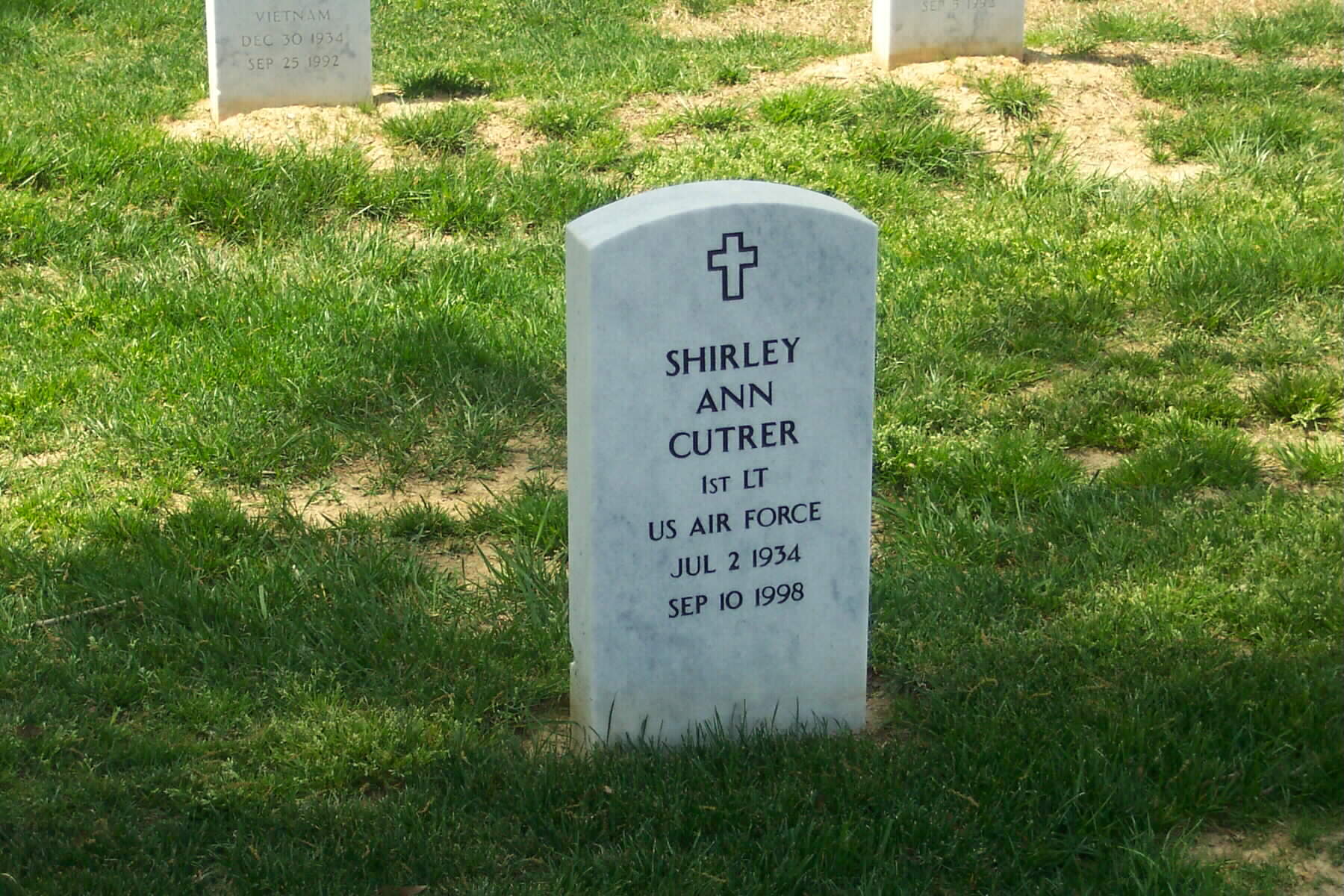Fred Clay Cutrer, Jr. was born on January 9, 1935 and joined the Armed Forces while in Osykra, Mississippi,
He served in the United States Air Force and in 8 years of service, he attained the rank of Captain.
Fred Clay Cutrer is listed as Missing in Action.
First pilot recorded killed in Vietnam buried
at Arlington National Cemetery
Thursday June 6, 3:04 PM ET
With a 21-gun salute, the remains of the first U.S. pilot recorded killed in Vietnam were buried by the Air Force at Arlington National Cemetery on Thursday.
Captain Fred “Potlick” Clay Cutrer’s remains were found in 1997 with the help of a Vietnamese native who saw his B-57 bomber plummet to earth in Long Khan Province on August 5, 1964. Cutrer was from Osyka, Mississippi.
Cutrer’s gold-colored coffin was brought to the grave site in a horse-drawn carriage as rows of Air Force officers and his family looked on.
Also honored were Cutrer’s navigator, Lieutenant Leonard L. Kaster. Kaster was posthumously awarded the Purple Heart Award on Thursday. His remains were never found.
Both Cutrer and Kaster had been presumed dead.
Brigadier General Frank Faykes presented flags to the families of both men.
A military caisson carries the casket of Air Force Captain Fred Cutrer Jr., of Osyka,
Mississippi, during funeral services at Arlington National Cemetery in Arlington, Va.
Thursday, June 6, 2002. The remains of Cutrer, the first U.S. pilot recorded killed
in Vietnam, were found in 1997
Fred Cutrer, son of the late Air Force Captain Fred Cutrer Jr., of Osyka, Mississippi,
wipes his eyes while holding the flag that had covered his father’s coffin, during
funeral services at Arlington National Cemetery
Source: Tribune Chronicle, (Ohio) May 26, 2002
Pilot finally coming home
Green tarnish covers portions of the battered dog tag. Some of the letters and numbers are eaten through from being buried for 35 years in wet, acidic soil.
The name remains legible: ”Cutrer, Fred.”
In 11 days, the long-missing Vietnam War fighter pilot will come home to be buried in Arlington National Cemetery.
”It’s kind of closure for the full thing,” Fred Cutrer III, 40, of Canfield said. ”To me, it’s an honor he’s going to be buried in Arlington.”
Fred and brother Donald Cutrer, 39, also of Canfield, grew up on the North Side of Youngstown uncertain of their father’s fate.
The boys were 1 and 3 when U.S. Air Force Captain Fred Clay Cutrer Jr.’s B-57B Canberra was shot down on August 6, 1964, over South Vietnam. He was among the first wave of President Johnson’s military response to an attack on U.S. destroyers in the Gulf of Tonkin and the beginning of full-scale American involvement in the war.
”In the back of my mind, I always thought there was a chance, maybe. … But the longer time went on, I knew,” said Fred III, an engineer at Roth Brothers in Austintown who retired from the 910th Airlift Wing Civil Engineer Squadron about five years ago after 19 1/2 years in the Reserves.
The 29-year-old pilot was listed as missing in action. When the Vietnam Wall Memorial was dedicated in Washington, D.C., in 1982, Cutrer’s name was on it. First panel, east side, Line 60.
The biographical paragraph states simply that he died while missing in Long Khanh, and his body was not recovered.
The first rays of hope came in August 1992 when the Defense Department’s POW/Missing Personnel Office found the crash site. Follow-up visits led to an excavation in March and April 1997.
”They found him in a crater 10 feet deep,” said Donald Cutrer, an engineer at Waco Scaffolding and Equipment in Akron, and a chief reserve loadmaster flying out of the Youngstown Air Force Reserve Station.
”They were ready to close the site. They’d gone deeper than any other site. It was at that point they found Dad’s dog tags, then part of the aircraft with the aircraft ID plate, and then the life-support equipment.”
The Cutrer family was notified in January 1998 of the discovery of bone fragments possibly belonging to the pilot and his navigator, First Lieutenant Leonard Lee Kaster of Massachusetts.
Skeletal remains were few. The family opted against having any more of the remains taken for DNA testing. The dog tag and other evidence was enough.
The family did not talk publicly about Cutrer’s homecoming until the last month when all confirmations and arrangements were made. His remains will be flown in from Hickam Air Force Base in Hawaii.
”On June 6, we’ll bury him and his navigator in Arlington National Cemetery,” Donald said.
The sons’ mother, a First Lieutenant who was honorably discharged as an Air Force nurse in 1962 after becoming pregnant with Fred III, will be exhumed and buried beside her husband’s plot on June 4.
Knowing that their father gave his all in service to his country did not deter the boys from following in their parents’ paths.
”Our whole family has been in the military, all our uncles and cousins,” Fred III said.
”I don’t know how people can be anti-military living in this country,” Donald said. ”It is the military that gave us the freedoms we have. Especially me flying around the world, I see the conditions they are living in other countries, and when we come
home, our worst day is their best day.”
Memorial Day is an excellent time to salute not just military heroes but all those who have gone on before.
”It’s a day everyone can remember friends and family no longer with us.
”I usually spend my Memorial Day flying low passes for the parades. Then I go home or to my brother’s home for the traditional hot dogs and hamburgers,” Donald said.
But this year, traditions will mean a little more to the Cutrer brothers, knowing Dad is finally coming home.
CUTRER, FRED CLAY JR.
Remains Identified 10/30/01
- Name: Fred Clay Cutrer, Jr.
- Rank/Branch: O3/US Air Force
- Unit: 405th Fighter Wing
- Date of Birth: 09 January 1935
- Home City of Record: Osyka MS
- Date of Loss: 06 August 1964
- Country of Loss: South Vietnam
- Loss Coordinates: 110953N 1070444E (YT270349)
- Status (in 1973): Killed/Body Not Recovered
- Category: 2
- Aircraft/Vehicle/Ground: B57B
- Refno: 0036
Other Personnel in Incident: Leonard L. Kaster (missing)
Source: Compiled by Homecoming II Project 01 September 1990 from one or more
of the following: raw data from U.S. Government agency sources, correspondence with POW/MIA families, published sources, interviews. Updated by the P.O.W. NETWORK 2002.
REMARKS: AC CRASH EXPLODE HVY VC – J
SYNOPSIS:
The B57 Canberra was one of the aircraft used by the U.S. Air Force to bomb the Ho Chi Minh Trail. The Canberra first came to the Vietnam theater at the time of the Gulf of Tonkin incident in 1964. It proved too vulnerable and difficult to repair for working targets over North Vietnam, but proved effective in the armed reconnaissance Trail operations of Operation Steel Tiger. The Canberra was sometimes used in conjunction with other, more sophisticated aircraft, such as the C130, and was especially effective on night missions.
Captain Fred C. Cutrer Jr. was the pilot of a Canberra sent on an operational mission over South Vietnam on August 6, 1964. The navigator onboard the aircraft was First Lieutenant Leonard L. Kaster. Aircraft control last heard from the
aircraft by radio when it was northeast of Tan Son Nhut.
The aircraft went down near the Sang Dong Nai River in Long Khan Province, South Vietnam. According to Defense Intelligence data, it received heavy fire from Viet Cong forces, crashed and exploded. Neither crewman was believed to have survived. Both were classified Killed in Action, Body Not Recovered.
Cutrer and Kaster are listed among the missing because their remains were never recovered. Others who are missing do not have such clear-cut cases. Some were known captives; some were photographed as they were led by their guards. Some were in radio contact with search teams, while others simply disappeared.
Well over 1000 first-hand, eye-witness reports of American prisoners still alive in Southeast Asia have been received by 1990. Most of them are still classified. If, as the U.S. seems to believe, the men are all dead, why the secrecy after so many years? If the men are alive, why are they not home?
Fred C. Cutrer, Jr. was promoted to the rank of Major before a determination
of death was made.
AMERICANS ACCOUNTED FOR:
The League learned today that the remains of seven US personnel previously unaccounted for from the Vietnam War had been identified. The remains of Navy CDR John A. Feldhaus of TN were jointly recovered in North Vietnam on April 26, 2000. The remains of Air Force Reservists Captain Fred C. Cutrer, Jr, of Mississippi and First Lieutenant Leonard Lee Kaster of Massachusetts, were jointly recovered in South Vietnam and repatriated on May 22, 1997. The February 11, 2000, joint recovery in Laos of the remains of four Americans brought identification of WO1 Barry F. Fivelson of IL, Specialists 4th Class Willis C. Crear of Alabama, Donald E. Crone of California and John L. Powers of Idaho.
Comment:
The League offers support to each family, recognizing the end to many years of uncertainty for all. This brings the number accounted for since the end of the war to 636: 455 from Vietnam, 156 from Laos, 23 from Cambodia and 2 from the PRC. Of the 1949 still missing and unaccounted for, 1470 are in Vietnam, 411 in Laos, 60 in Cambodia and 8 in the territorial waters of the PRC. Of the total number, roughly 90% were lost in areas under Vietnam’s wartime control.
Remains of first U.S. pilot recorded killed in Vietnam to be buried in Arlington
The remains of Captain Fred “Potlick” Clay Cutrer lay buried one meter beneath the surface of a jungle bog for 33 years, mired in obscurity and hidden from his family’s grasp for closure.
But in the spring of 1997, the Department of Defense, with the aid of a Vietnamese native who witnessed Cutrer’s B-57 Bomber plummet to earth in Dong Nai Province Aug. 5, 1964, made a discovery and started the Cutrer family’s healing.
And on June 6, Cutrer’s sister Lillie Cutrer Gould, and his sons Don and Fred II, will travel to Washington D.C., where they will officially end the uncertainty. On that day, at 11 a.m., the Osyka native will be buried in Arlington National Cemetery in Washington, D.C., with full military honors. The Air Force will place Captain Cutrer’s remains in a coffin that will also bear the name of his co-pilot, Lieutenant Leonard Lee Kaster.
Kaster’s body was never found, though the military excavated the plane’s two seats near the crash site, indicating the men did not eject.
Later this summer, the body of Cutrer’s wife, Shirley, an Air Force nurse, will be placed next to Fred’s remains. Shirley died September 10, 1998, when her car collided with an 18-wheeler in Pennsylvania.
During the funeral, five Air Force jets will perform a “missing man” fly over, according to son Fred, where the plane positioned in the middle point of a “V” formation peels away from the group, signifying a missing soldier.
The decision to bury Cutrer in Washington and not Osyka had as much to do with honoring Kaster as it did Cutrer, according to Gould. She said military officials told her Kaster would not have his own military funeral because his remains were never found. But they said Kaster could be honored at her brother’s Arlington Cemetery burial.
Gould worried that because no one from the Kaster family is left to make burial arrangements, his heroism and presumed death might pass unnoticed.
“My brother asked me before he ever went overseas if anything happened, to take him back to Osyka,” said Gould, 70, a retired grade school teacher living in Metairie, La. “I always wanted to get him home, but I just can’t let that poor man (Kaster) go unnoticed.”
Gould’s three children, their spouses, two grandchildren, other family members and friends are making the trip to Washington. Twenty-five people from Pike County and Kentwood, La., recently bought their plane tickets, she said.
Later this summer, the body of Cutrer’s wife, Shirley, an Air Force nurse, will be placed next to Fred’s remains.
Shirley died September 10, 1998, when her car collided with an 18-wheeler in Pennsylvania
Photos By M. R. Patterson, October 2002
Michael Robert Patterson was born in Arlington and is the son of a former officer of the US Army. So it was no wonder that sooner or later his interests drew him to American history and especially to American military history. Many of his articles can be found on renowned portals like the New York Times, Washingtonpost or Wikipedia.
Reviewed by: Michael Howard

